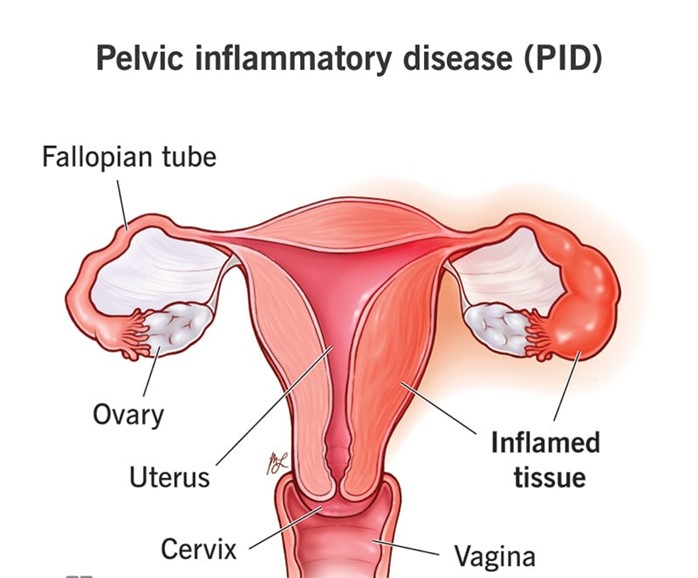After teaching a group of adolescent girls about female reproductive development, the nurse determines that teaching was successful when the girls state that menarche is defined as a woman's first:
Sexual experience
Menstrual period
Signs of breast development
The Correct Answer is B
Choice A: Sexual experience is not the correct answer because it is not related to female reproductive development. Sexual experience is a personal and subjective term that can vary depending on the individual's definition, values, and preferences. It has no biological or physiological significance for female reproductive development.
Choice B: Menstrual period is the correct answer because it is related to female reproductive development. The menstrual period is a cyclic phenomenon that occurs when the endometrium (the lining of the uterus) is shed along with blood and mucus through the vagina. It marks the onset of puberty and fertility in females. Menarche is the term used to describe the first menstrual period in a woman's life.
Choice C: Sign of breast development is not the correct answer because it is not related to female reproductive development. A sign of breast development is a physical change that occurs during puberty in females. It involves the growth and maturation of the mammary glands, which are responsible for producing milk during lactation. However, it does not indicate the start of menstruation or fertility in females.
Nursing Test Bank
Naxlex Comprehensive Predictor Exams
Related Questions
Correct Answer is C
Explanation
Choice A: African American women have the BRCA 1 and BRCA 2 gene is not the correct answer because it is not a fact but a misconception. BRCA 1 and BRCA 2 are genes that normally help prevent breast and ovarian cancer by repairing DNA damage. However, mutations in these genes can increase the risk of developing these cancers. BRCA mutations are not exclusive to African American women, but they can affect any race or ethnicity. According to the National Cancer Institute, about 12% of American white women and 10% of African American women have a BRCA mutation.
Choice B: American white women respond better to breast cancer treatment is not the correct answer because it is not a fact but a disparity. Breast cancer treatment can include surgery, radiation, chemotherapy, hormone therapy, or targeted therapy. The response to treatment can vary depending on various factors such as tumor type, stage, grade, or molecular profile. However, some studies have shown that American white women have better survival rates and outcomes than African-American women after breast cancer treatment. This disparity may be due to differences in access to care, quality of care, socioeconomic status, or biological factors.
Choice C: Breast cancer is more advanced in African American women when found is the correct answer because it is a fact and a disparity. Breast cancer is a disease that occurs when abnormal cells grow and invade the breast tissue or other parts of the body. The stage of breast cancer describes how far the cancer has spread and how serious it is. Breast cancer can be detected by screening tests such as mammograms or clinical exams such as breast self-exams. However, some studies have shown that African American women are more likely than American white women to be diagnosed with breast cancer at later stages. This disparity may be due to differences in screening rates, awareness, symptoms, or tumor biology.
Choice D: More Hispanic women smoke, which increases their risk is not the correct answer because it is not a fact but a misconception. Smoking is a risk factor for breast cancer, as it can damage the DNA of breast cells and increase the levels of hormones that stimulate cell growth. However, smoking rates are not higher among Hispanic women than other racial or ethnic groups. According to the Centers for Disease Control and Prevention, about 14% of Hispanic women smoke cigarettes compared to 16% of American white women and 14% of African American women.
Correct Answer is C
Explanation
Choice A: Ask the client's English-speaking family member to translate. This action is not appropriate because it may compromise the accuracy and confidentiality of the information. The family member may not have sufficient medical knowledge or vocabulary to translate correctly or may omit or alter some details due to personal bias or embarrassment.
Choice B: Use a translation dictionary to reinforce the teaching. This action is not appropriate because it may be time-consuming and ineffective. The translation dictionary may not have all the relevant terms or phrases or may provide inaccurate or ambiguous translations. The nurse may also lose the client's attention or interest by relying on the dictionary.
Choice C: Seek assistance from a facility-approved interpreter. This action is appropriate because it ensures the quality and clarity of the communication. The facility-approved interpreter is a professional who has the skills and training to provide accurate and unbiased translation of the information. The interpreter can also facilitate the interaction and feedback between the nurse and the client.
Choice D: Ask an assistive personnel (AP) who speaks the client's language to serve as an interpreter. This action is not appropriate because it may violate the scope of practice and ethical standards of the AP. The AP may not have the qualifications or authority to provide interpretation services or may have a conflict of interest or role confusion with the client. The AP may also have other duties or responsibilities that may interfere with the interpretation process.

Whether you are a student looking to ace your exams or a practicing nurse seeking to enhance your expertise , our nursing education contents will empower you with the confidence and competence to make a difference in the lives of patients and become a respected leader in the healthcare field.
Visit Naxlex, invest in your future and unlock endless possibilities with our unparalleled nursing education contents today
Report Wrong Answer on the Current Question
Do you disagree with the answer? If yes, what is your expected answer? Explain.
Kindly be descriptive with the issue you are facing.
